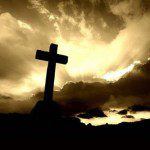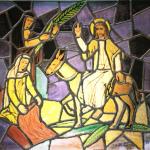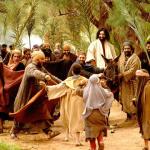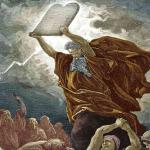Holy Week is a lifetime in miniature. It goes from celebration to conflict, betrayal, suspense, and then back to a celebration that lasts a lifetime. As the commercial says, “life comes at you fast,” and so does Holy Week. We almost need a month to let the events of Holy Week sink in spiritually and emotionally. When everything seems to be going well in your life, out of the blue, you or a loved one receives the
diagnosis of a life-threatening illness. Without warning, you lose your job and wonder how you’ll ever reclaim your former professional or economic status. We all eventually live a Holy Week, whether in terms of the first or twenty-first centuries.
In his discussion of the Psalms, Walter Brueggemann describes the rhythm of our lives
in terms of orientation, disorientation, and reorientation, all of which occur during Holy Week. It is easy to go from waving palms and shouting “Hosanna” to singing “Christ the Lord is Risen Today,
Alleluia!” without taking account of religious conflict, betrayal, injustice, agony, and hopelessness that accompany our Easter celebrations.
Holy Week can forever change us if we embrace the seasons of the week and the
seasons of our lives, both the sunshine and the shadow and the celebration and desolation. Life’s greatest challenges can also be the womb of life’s greatest possibilities.
Mostcongregations join both palms and passion on what was traditionally called Palm
Sunday. The rationale is that we won’t skip over the pain of betrayal of Maundy Thursday and the abandonment of Good Friday on our way to Easter. While this practice reflects liturgical and theological wisdom, often celebration gets lost among the extensive passion readings of Palm/Passion Sunday.
Palm Sunday begins with celebration. A spiritual practice for Palm Sunday might involve praying your “hosannas” and joys. Take time to shout, dance, wave some palms, and give thanks for God’s witnesses in your life. Let your body and spirit together worship God. Let this be a day of celebration in spite of the ambiguities and conflicts of life. There will be enough time for suffering later in the week.
The next moment of Holy Week involves Jesus’ conflict with religious and governmental
authorities. Jesus “occupies the Temple,” tossing out the vendors who make religion a mercantile enterprise.
Monday through Wednesday of Holy Week provide opportunities for spiritual examination,
focusing on questions such as:
- From what unjust structures do you personally benefit?
- Where do you participate in practices that go against the gospel mandates of justice
and inclusion? - Where do religious structures profit from manipulating simple believers?Where
does our nation need to mend its ways to be faithful to God? - Imaginatively speaking, what booths might Jesus overturn in contemporary religion? Or our
congregation?
Maundy Thursday joins memory, hope, and Eucharist with experiences of betrayal and
abandonment. Maundy Thursday invites us to live eucharistically as we remember God’s action in history and our lives,and live hopefully toward the future as we recall the tragedies of life. The day invites us to consider the power oflife’s shadows to threaten human well-being. If Christ can be abandoned, then which of us is safe from destitution and abandonment? If Jesus’ closest male followers abandon him, where are we abandoning Jesus’ way by our lifestyles and values? In what ways can we deepen and strengthenour spiritual stature so that we can be awake and faithful in the time of
trial? In a world in which many are abandoned, who are we called to embrace and welcome?
There is really nothing “good” about Good Friday!
It is a day of unmitigated suffering and alienation. But, it is also the day in which we proclaim
the message of the hymn, “Were You There When They Crucified My Lord?” We have to ask ourselves where we would be when Jesus was crucified. Would we be
among the jeering crowds? The faithful women? Or, the cowardly disciples? Good
Friday is a perfect opportunity for an imaginative prayer.
After reading the Good Friday scriptures, take some time for stillness.
Then imagine the scene at Calvary. Visualize yourself among those who were witnesses to the
crucifixion. What is theenvironment? Who is present around the Cross? What is Jesus’ appearance? Does he say anything or respond in a particular way to what’s going on? Where are you in the scene? How do feel as you witness the crucifixion?
What do you do when Jesus breathes his last? Where do you go following Jesus’ death? Where is your
hope on Good Friday and beyond?
Holy Saturday is the day of uncertainty and suspense. There is no promise of a happy ending. Embracing the wisdom of Holy Saturday invites
us to consider the following: What is unresolved spiritually in your life? What are the forces of death that constrict your life? Where are you awaiting a resurrection? Where do you need to experience God’s new
life?
Easter inspires us to do our “happy dance.” Practicing resurrection (Wendell Berry) takes many forms – protesting injustice, spending more time with loved ones, doing something you thought was
impossible, singing alleluias, awakening to beauty. The Psalm of the day is “This is the day that
God has made. Let us rejoice and be gladin it.” Rejoice and give thanks for the
gift of life. Bless everyone you meet and receive life from everyone you meet.
Where is your resurrection? Let the energy of grace flow through you. Imagine the
energy of Easter giving you new life out of death-filled situations. Vow to choose life every moment of the day as Christ’s ambassador of resurrection.
Bruce Epperly is a theologian, spiritual guide, pastor, and author of twenty two
books, including Process Theology: A Guide to the Perplexed, Holy
Adventure: 41 Days of Audacious Living, Philippians: An Interactive Bible Study, and The Center is
Everywhere: Celtic Spirituality for the Postmodern Age. His most recent text is Emerging Process:
Adventurous Theology for a Missional Church. He also writes regularly for the Process and Faith lectionary. He may be reached at drbruceepperly@aol.com for lectures,
workshops, and retreats.















